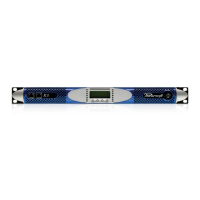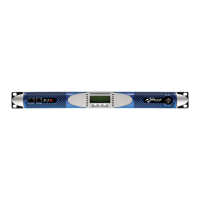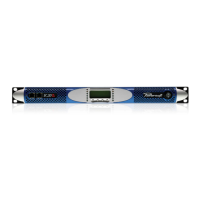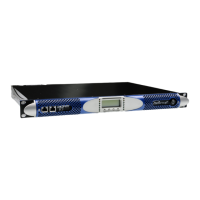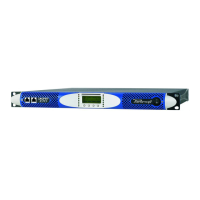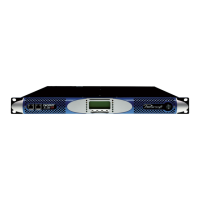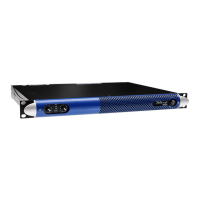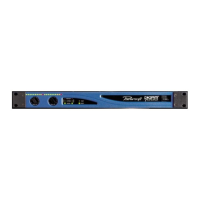Average power/
rated power
Power
compression
(dB)
Equivalent series resistance
for 8 � driver (�)
10% 1.4 1.0
20% 2.0 1.4
50% 2.8 2.1
100% 4.5 3.8
8.3 CH1/CH2 Setup
8.3.1 Auxiliary Delay
This delay is a further input delay acting on the input EQ This delay
is not based on the input eq bypass.
8.3.2 Diagnostics
The diagnostics tool allows the user to program and test the
integrity of the input and/or output line. The input test is based
on the detection of a pure tone (generated by an external tone
generator) on any input line. The output test reliess on the
measurement of the impedance at a well dened frequency: the
amplier can generate a pure tone and measure the voltage and
current at the generated tone frequency. It is therefore possible
to recalculate the impedance at that specic frequency. When an
alarm condition is met, the user can be informed of the event via
software or directly from the amplier.
Tone in Alarm
The tone in alarm can measure the integrity of any input line
feeding signal into the amplier. This detector can measure a tone
applied by an external generator.
▶
Tone in Alarm, enable/disable the input tone detection
▶
Tone in Vmin, the frequency of the tone that has to be
detected (range 20 Hz - 24 kHz, step of 10 Hz)
▶
Tone in Vmax, the minimun thershold value that has been
detected (range 0 Vrms - 4 Vrms, step of 10 mVrms )
▶
The maximum threshold value that has been detected (range
0 Vrms - 4 Vrms, step of 10 mVrms )
Tone out gen
The inner tone generator allows the user to generate a tone that
can be used to check the integrity of the output line. This tone
should be used outside of the freqeuncy bandwidth of the driven
speaker to avoid can be listen.
▶
Tone out gen, enable/disable the internal generator
▶
Tone out ampl, the output voltage of th generator (range 0
Vrms - 20 Vrms, step of 1 Vrms
▶
Tone out freq, the frequency of the tone that has to be
generated and eventually detected (range 20 Hz - 24 kHz,
step of 10 Hz)
Tone out alarm
The output tone detection can measure the presence of a tone
generated by an external or internal generator.
▶
Tone out Alarm, enable/disable the output tone detection.
▶
Tone out Vmin, the minimun detected threshold voltage
value (range 0 Vrms - 20 Vrms, step of 1 Vrms )
▶
Tone out Vmax, the maximum detected threshold voltage
value (range 0 Vrms - 20 Vrms, step of 1 Vrms )
Load Alarm
The output Load Monitor allows to detect the impedance load at
a certain frequency. The high resolution algorithm implemented in
this tool allows accurate measures.
▶
Load Alarm, enable/disable the impedance detection.
▶
Load Zmin, the minimun allowed impedance threshold value
(range 0 Ω - 500 Ω, step of 0.1 Ω )
▶
Load Zmax, the maximum allowed impedance threshold
value (range 0 Ω - 500 Ω, step of 0.1 Ω )
Measures
Pressing the button measures gives access to a sub menu where
the various amplier readings are available.
▶
Tone in, measurements of the input tone at the selected
frequency.
▶
Tone out, measurements of the output tone at the selected
frequency.
▶
Z load, measurements of the load at the selected frequency.
8.4 Input EQ
This menu allows to turn on / turn off the input processing block.
This can be useful when resetting the amplier to the original
“output processing only” behavior without using any software.
Turning off the Input EQ, all input processing set up using, for
example, the Armonía Audio Suite can be bypassed at once. It
is advisable to save amplier presets with this setting turned off:
in this way when loading presets the user can be sure that only
the output processing is enabled. The burden of re-enabling and
setting up input processing is left to the remote control software.
8.5 Reset Input Section
This operation disables the input processing (input EQ, input gain
and delay) and resets the aux delay to zero.
8.6 Reset Output Section
This function disables all output EQ, limiters and damping
functions.
Warning: this operation may potentially damage connected
speakers. Pay special attention to shutting down any audio
source before using this function.
9 Network Operations
Network capabilities and network setting menus are available only
for K Series ampliers equipped with a KAESOP board. KAESOP
stands for K (as in Powersoft’s K Series) AES3 and Ethernet Simple

